Russia This Week is a weekly review by the MEMRI Russian Media Studies Project, covering the latest Russia-related news and analysis from media in Russia, the Caucasus, Central Asia, and Eastern Europe.
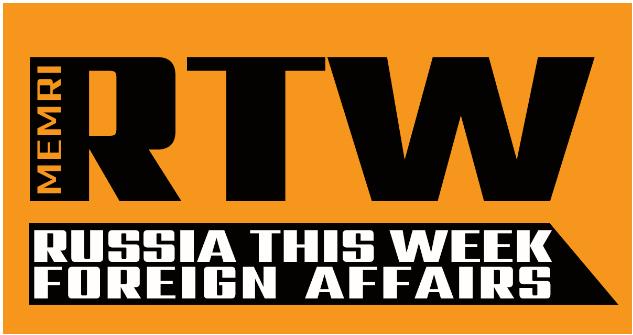
This issue of RTW features eulogies for veteran ally Fidel Castro, a blistering response to the EU's criticism of Russian media outlets and the withdrawal from the ICC.
Cartoon Of The Week

Twitter.com/sharzhipero, November 25, 2016.
After the end of his term as U.S. President, Barack Obama becomes a cab driver.
U.S. President-elect Donald Trump directs him: "To the White House, please"
Zakharova Dixit
Russian Foreign Ministry spokesperson Maria Zakharova is one of the most-quoted Russian officials. She is known for using colorful language when describing Russian foreign policy in her weekly press briefings. The following are Zakharova's quotes of the week:

Recently, the Russian Cigar Union dedicated to Zakharova a special edition box of cigars with each cigar adorned with her picture. (Instagram.com/mzakharovamid)
On November 12, NATO secretary general Jens Stoltenberg penned an article in the British daily, The Guardian, titled "Now is not the time for the US to abandon NATO - nor should its European allies go" In the article, Stoltenberg wrote: "In the last few years we have seen a dramatic deterioration of our security, with a more assertive Russia and turmoil across north Africa and the Middle East. NATO allies have responded together. We have implemented the biggest reinforcement of our collective defense since the cold war. And the United States has significantly strengthened its commitment to European security, deploying a new armored brigade to Eastern Europe and delivering equipment and supplies to support future reinforcements if needed. This is deterrence, not aggression. We do not seek to provoke a conflict, but to prevent a conflict. NATO battalions numbering thousands of troops cannot be compared with Russian divisions numbering tens of thousands just across the border. Our response is defensive and proportionate. But it sends a clear and unmistakable message: an attack against one will be met by a response from all."
(Theguardian.com, November 12)
Commenting on Stoltenberg's article, Zakharova wrote in her official Facebook account: "Hereby is a short summary of (Stoltenberg's) publication translated to realpolitik language: 'Who's going to fund us and guide us? Who is going to pay for all that obscurantism we bear by Washington's will? We have forgotten how to think and act independently in recent years. We did everything for the American establishment including deploying troops and arms in our territories during peaceful times. So how can we look our own people in the eye? Our people will not forgive us this especially after the sanctions wars that ruined entire branches of our economies. And you will regret if we start living on our own independently. We turned a blind eye to whatever US has done in Afghanistan. We turned a blind eye that the drug (precursor) production there has grown manfold - and that these drugs are flowing to us in Europe. We keep silent about thousands of Alliance soldiers who became victims of the US adventure in Iraq. [We did so] not because we are ashamed but because you paid us off. And pay attention - the money was good enough. We are even prepared for a smaller amount if it suits you. We have also agreed to severe our relations with Russia by blaming her with all the sins for the sake of Washington's ruling administration, which placed a wager on it in order to hold on to the White House. Please understand us: we do not want to remove your blindfold because otherwise we'll need to recognize that we are detached from reality and still further that we are completely naked. Yours, hopefully forever, NATO's secretary general."
(Facebook.com/maria.zakharova.167, November 13)
Quotes Of The Week
During the Russian Geographical Society's award ceremonies on November 24, Russian President Vladimir Putin asked two young contestants who were 5 and 9-years old respectively (Timofei Tsoi and Miroslav Askirko), where do Russia's borders end. The answer was that Russian borders are limited by the Bering straits, which defined the limits of the Russian and US territories. Putin's remark was: "Russia's borders do not end anywhere" Putin later added: "That was a joke."
(Echo.msk.ru, November 24; Pravdareport.com, November 25)

(Echo.msk.ru, November 24)
On November 12, during his trip to the Avtodizel Motor Plant (an open joint-stock company and subsidiary of GAZ Group that produces engines), in Yaroslavl, Putin commented on the recent Russian drills: "Our armed forces are not out to threaten anyone. I want to stress this point once more so that everyone hears it, not only those present here today. Our army is not a threat, but it is combat-capable and has become modern and highly effective. We have dramatically increased the number of exercises and training maneuvers, including the spot inspections that sometimes cause our partners some concern. We do not get alarmed when they [the West] hold military exercises, but they immediately start getting nervous when we do so. They must be the nervous types. Let me say again that we are not a threat to anyone and have no intention of threatening anyone. Why should we want to? We have the biggest country in the world, as I already said, and everyone knows this. Our task is to ensure our own country and people's reliable security. Our armed forces have what they need to do this and we will continue to develop them."
(Kremlin.ru, November 12)
Tweet Of The Week:
Senator Alexey Pushkov (@Alexey_Pushkov) wrote on his Twitter account: "State Department: Russia has no reasons to consider NATO as a threat. Sure! This is a peace seeking alliance, which bombed Belgrade, Iraq and Libya purely for the sake of peace" The tweet refers to US State Department spokesman John Kirby's statement that the US did not see any reasons for Russia to consider NATO a threat.
(Twitter.com/Alexey_Pushkov, November 22)
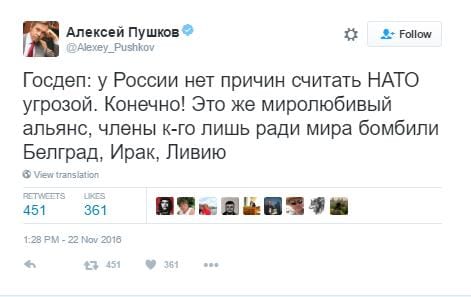
In another tweet, Pushkov wrote: "NATO's secretary general said that Russia should take the alliance's calmly. It follows that he should take the Iskanders calmly. Why is he so nervous?"

(Twitter.com/Alexey_Pushkov, November 24)
Lavrov Mania
Russian designer Kirill Karavayev became rich at the age of 23 by creating pro-government T-shirts featuring Foreign Minister Sergey Lavrov.
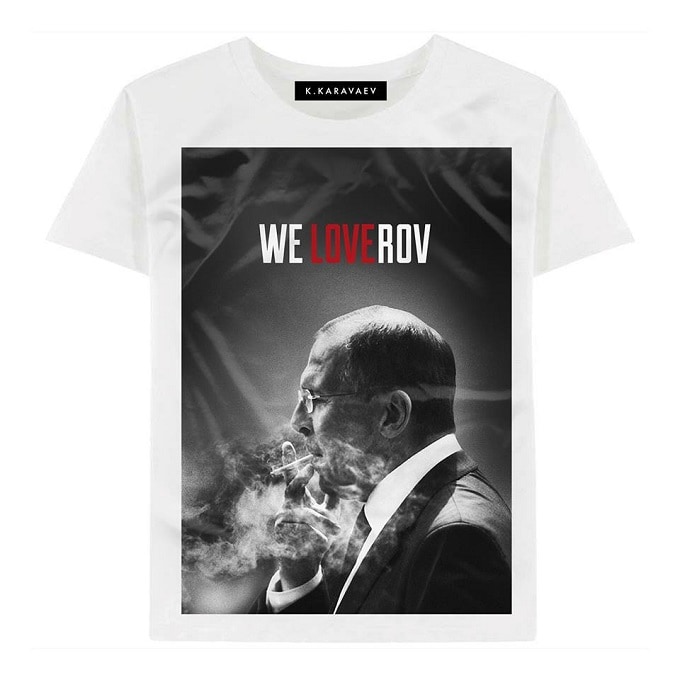
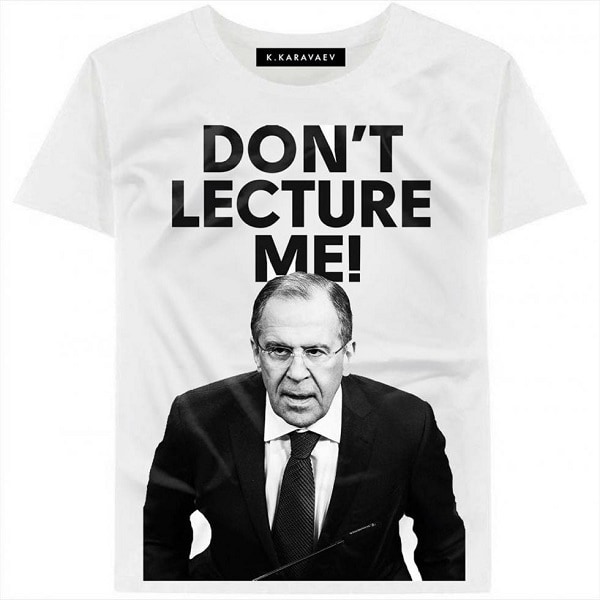
(Rbth.com, October 26)
In The News:
EU Resolution On Russian 'Propaganda Warfare'
The EU approved a resolution against Russian "propaganda warfare". The resolution stated: "The Russian Government is employing a wide range of tools and instruments, such as think tanks and special foundations (e.g. Russkiy Mir), special authorities (Rossotrudnichestvo), multilingual TV stations (e.g. RT), pseudo news agencies and multimedia services (e.g. Sputnik), cross-border social and religious groups, as the regime wants to present itself as the only defender of traditional Christian values, social media and internet trolls to challenge democratic values, divide Europe, gather domestic support and create the perception of failed states in the EU's eastern neighborhood; stresses that Russia invests relevant financial resources in its disinformation and propaganda instruments engaged either directly by the state or through Kremlin-controlled companies and organizations; underlines that, on the one hand, the Kremlin is funding political parties and other organizations within the EU with the intent of undermining political cohesion, and that, on the other hand, Kremlin propaganda directly targets specific journalists, politicians and individuals in the EU."
(Europarl.europa.eu)
During media questions following the APEC Economic Leaders' Meeting, Putin was asked:
Question: "Mr. President, the European parliament has passed a resolution against Russian media outlets, naming RT and Sputnik as dangerous. What is your view on this?"
Putin answered: "What can I say? These attempts continue, they keep trying to teach us democracy. We keep hearing from our teachers that the worst way to deal with your opponents is to ban something. They tell us that this goes against the norms and principles of democracy. The best road is always that of open discussion and using this discussion to present vivid and convincing arguments in defense of your point of view.
If what you say is true and they have passed this resolution, this suggests that we are witnessing a clear degradation (in the political sense) of the concept of democracy in Western society, in this case, at the level of the European parliament."
(Kremlin.ru, November 21)
Margarita Simonyan, editor in chief of Sputnik and RT, said:
"How come they [the EU] don't understand that small steps like these, stemming from the lack of desire to listen to another opinion, lead the countries to slide down the slippery slope of becoming blind dictatorships, which start unnecessary media wars. Then they look back at themselves with disappointment and ask themselves 'how could we?'. There were several states in Europe which have already been through this. ..It's easy and very pleasant to talk about freedom of speech unless there is different opinion, which has not been heard previously. As soon as our information agency and television channel loudly voice this different kind of opinion - they (Europe) immediately got frightened and decided that freedom of speech is an excessive luxury for such, apparently, vulnerable countries as the European ones and for such a vulnerable organization as the EU."
(Ria.ru, November 23)
SUPPORT OUR WORK

During her weekly press briefing, Zakharova commented on the EU resolution: "We must state with regret that the EU never pauses in its efforts to demonize Russia. In certain cases, its anti-Russian paranoia goes through the roof. We can't call this document anything other than an exercise in paranoia. We can provide all kinds of opinions, we can analyze it, but all that we'll come to as a result of this analysis will be exactly in this vein. The European Parliament has accepted yet another anti-Russian 'masterpiece': the resolution on EU Strategic Communication to Counter anti-EU Propaganda by Third Parties. Its title itself speaks volumes about the fact that the European Union is not in touch with the rest of the world and is in opposition to all others. This is an odd ideology.
"The document abounds in all sorts of phobias, concoctions and myths. On the other hand, this document is a graphic reflection of the ideology that the EU has cultivated vis-à-vis Russia in recent time. I would like to stress that the resolution equates the Kremlin's alleged 'propaganda war' against the West with the propaganda methods practiced by the Islamic State, a terrorist organization banned in the Russian Federation. It's just a clinical case.
"We have repeatedly stated - and I would like to reiterate it today - that Russia does not engage in anti-EU propaganda. If the EU has certain internal problems, their causes should be sought inside the EU, not in propaganda by third parties. This is the road back to a realistic perception of reality, to the [EU's] own self. Russia is interested in a united, stable and predictable EU, a partner with which we would like to promote equitable and mutually beneficial cooperation. We hope that the EU will finally realize that Russia is not an enemy to Europe and does not wish it ill.
"We hope that this resolution will not be followed by practical decisions to restrict the Russian media. And we are hoping with good reason, because the approval of this document (regrettably, it has the status of a document) has raised a huge wave of resentment within the EU itself. Many public figures said directly about this resolution that it was a disgrace for European countries to approve such documents in the 21st century. If, however, this document is implemented in practice, with the EU countries imposing restrictions on the Russian media, we will certainly retaliate.
"I would like to finish this highly unpleasant part of today's briefing by saying the following. If Europe takes this path, choosing it as its main road, namely, if it proclaims a media ban as its priority, then, to be honest, the time is not far off when the EU countries install radio relay stations on their borders with other countries, which will broadcast propaganda of 'Western values' (please note this because we will return to this somewhat later. I hope this will not happen). Or perhaps they will even go as far as start burning books which someone in the EU will think are at variance with the dominant ideology. Europe has been through all this already. Hasn't it drawn any lessons?"
(Mid.ru, November 24)
The Chairman of the Committee on International Affairs of the Russian Federation's State Duma, Leonid Slutsky, said: "In its Russo-phobic hysteria, the European Parliament is placing the blame on someone else substituting the term 'good' for the term 'evil.' This is pretty much the agony of Western politicians who survive only due to their fierce antagonism towards Russia."
(Ria.ru, November 23)
The Chairman of Russia's Federation Council Committee on Foreign Affairs, Senator Konstantin Kosachev, stated: "The fact that these resolutions are popping up reflects the Western system's serious crisis - [a crisis] that not only affects institutions but also values. If such phenomena as Brexit, or Trump's victory, or the rise in the popularity of right wing parties, or anti-immigration sentiments in Europe, as well as the fall of popular confidence in politicians and the media, must be explained by a strictly 'Stalinist approach' as a result of 'hostile enemy propaganda' - then the whole thing speaks for itself. The West unexpectedly clashes with its own unwillingness for authentic media pluralism - so 'the West' is trying to blacken the source of information itself. They essentially fight with opinions rather than facts."
(Ria.ru, November 23)
Senator Aleksey Pushkov stated: "The European Parliament's resolution reflects the panic amongst the majority of the EU MPs regarding the loss of the information monopoly, which the West enjoyed until recently. It clearly stipulates that in spite of all the talks regarding free speech and free flow of information, the majority of EU MPs pathologically fear information competition and are totally unprepared for it."
(Ria.ru, November 23)
Russia-Japan Crisis

Vitaly Podvitsky, Ria.ru, November 23.
Caption: "Hey, sensei, get back to reality".
On November 22, the Russian Defense Ministry deployed Bal and Bastion anti-missile systems on the Kuril islands of Iturup and Kunashir. Pravdareport.com reported: "Coastal missile complex Bastion is equipped with supersonic missiles P-800 Onyx. The system is able to destroy surface ships of different classes and types. One system may have up to 36 missiles to be able to protect more than 600 km of coastline. Armed with low-altitude subsonic anti-ship missiles X-35, the Bal missile system is able to destroy ground and surface targets of the enemy at a distance of about 130 km. The X-35 missile is capable of destroying ships with a displacement of 5,000 tons."
(Pravdareport.com, November 23)
Japan's Prime Minister Sindzo Abe said: "We have used diplomatic channels to say this does not go in line with this country's position and causes regret."
(Tass.com, November 14)
Foreign Minister Fumio Kishida will visit Russia on December 3 to hold talks with Lavrov in Moscow, whereas Putin is scheduled to visit Japan on December 15 and 16.
(The-japan-news.com, November 25)
Russia's Reactions To Castro's Death
Putin offered condolences following the death of the Cuban Leader Fidel Castro. Putin's telegram said: "Fidel Castro was a sincere and reliable friend of Russia. He made a huge input in establishment and development of the Russian-Cuban relations and close strategic partnership in all spheres."
(Tass.com, November 26)
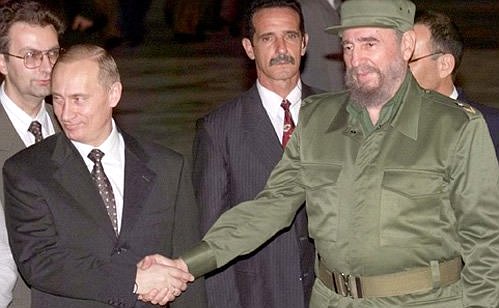
Putin with Cuban leader Fidel Castro in Havana, on December 14, 2000. (Kremlin.ru)
The former President of the USSR Mikhail Gorbachev said of Castro: "He was an outstanding personality, unique... I had a very positive opinion about him. Very positive. I met him at congresses, and then I was in Cuba, and there we discussed common interests, we talked. We became very good friends and remained such... He took very close to heart what happened to perestroika. Well, I also took it even more to heart."
(Tass.com, November 26)
Leonid Slutsky, the head of the Duma's Foreign Relations committee, said: "[Fidel Castro] was a legend... he will eternally symbolize the fight against uni-polar world principles and the coercion of countries by foreign states to choose their path. After 50 years of struggle, despite blockade and hardships, Cuba proved victorious in its confrontation with the U.S. - it was done under Castro's leadership. The recently declared U.S. policy to restore relations with Cuba proves the absurdity and non-effectiveness of any sanctions and embargoes."
(Ria.ru, November 26)
Konstantin Kosachev, head of the Council of the Federation Committee on Foreign Affairs,said: "Regardless of how you perceive his personality, his scope without exaggeration was and he truly influenced the course of history."
(Ria.ru, November 26)
The Speaker of the Duma, Vyacheslav Volodin, said: "He served as a guide for the entire world on the ideas of a welfare state - he was an invincible fighter for the independence of his own country, which under his leadership became a most influential member of international society."
(Ria.ru, November 26)
Russian Prime Minister Dmitry Medvedev eulogized Castro in an official letter: "He devoted his whole life for serving his country. Cuba gained freedom and independence, built contemporary statehood and strengthened its authority in Latin America under his leadership."
(Ria.ru, November 26)
Gennady Zuganov, the Communist party (KPRF) leader, said: "I express my condolences to the Cuban people and the whole mankind. The man who passed away should not only be worshiped, but people should be proud of him and follow his path in their lives. I'm sure that our country remembers its friends and will do whatever possible to commemorate his legacy."
(Ria.ru, November 26)
Russia Withdraws From The ICC
On November 16, Russia withdrew from the International Criminal Court (ICC), as Putin signed the Decree "On the intention not to become a party to the Rome Statute of the International Criminal Court". The decision came, after the ICC released a decision stating that an international armed conflict exists between Russia and Ukraine, and that Russia's presence in the Crimea is a military occupation.
The Russian Foreign Ministry stated: "Russia has been consistently advocating prosecuting those responsible for the most serious international crimes. Our country was at the origins of the Nuremberg and Tokyo tribunals, participated in the development of the basic documents on the fight against genocide, crimes against humanity and war crimes. These were the reasons why Russia voted for the adoption of the Rome Statute and signed it on September 13, 2000. The ICC as the first permanent body of international criminal justice inspired high hopes of the international community in the fight against impunity in the context of common efforts to maintain international peace and security, to settle ongoing conflicts and to prevent new tensions.
Unfortunately the Court failed to meet the expectations to become a truly independent, authoritative international tribunal. The work of the Court is characterized in a principled way as ineffective and one-sided in different forums, including the United Nations General Assembly and the Security Council. It is worth noting that during the 14 years of the Court's work it passed only four sentences having spent over a billion dollars.
In this regard the demarche of the African Union which has decided to develop measures on a coordinated withdrawal of African States from the Rome Statute is understandable. Some of these States are already conducting such procedures.
The Russian Federation cannot be indifferent to the Court's attitude vis-a-vis the situation of August 2008. The Saakashvili regime's attack on peaceful Tshinval, the assassination of the Russian peacekeepers resulted in the Court's accusations against South-Ossetian militia and Russian soldiers. Eventual investigation of actions and orders of Georgian officials was left to the discretion of the Georgian justice and remains outside of the focus of the ICC Prosecutor's office attention. This development speaks for itself. We can hardly trust the ICC in such a situation."
(Mid.ru, November 16)
Senator Andrey Klishas, Chair of the Federation Council's Constitutional Law Committee: "The President's decision is consistent with the Russian Constitution and international law, since every single sovereign state independently decides which international treaties it is party to and the jurisdiction of which international organs it recognizes".
(Ria.ru, November 16)
Leonid Slutsky, chair of Duma's International Affairs Committee, said: "By equating the 2014 events in Crimea to an armed intervention the ICC crudely violated the norms embedded in the UN Charter regarding the right of peoples tp self-determination."
(Kommersant.ru, November 16)
New Round Of U.S. Sanctions
The U.S. Department of the Treasury imposed new sanctions on six individuals representing Crimea and Sevastopol in the Russian Duma. Commenting on the decision, Deputy FM Sergey Ryabkov said: "We will definitely respond... We regret that the administration, which will cease to exist in 60 days, is clinging to its own phantoms and demonstrates - aside the lack of common logic - the absence of a mere desire to try restoring the relations which were ruined by Washington... Our goal is to look for the future and seek a more positive agenda, after the authors of a failed policy ( towards our country) resign and will be replaced by people, who, we hope, will take a more responsible approach towards relations with Russia".
(Ria.ru, November 15)
New Electronic Warfare Defense System
Russia to develop new electronic warfare defense system which is designed to disrupt US and NATO military communications (High Frequency Global Communications System ). This EW system is supposed to be national strategic one, capable of incorporating all existing EW capabilities into a single chain.
(Ria.ru, November 14)
Putin's Meeting With UN Secretary-General-Designate Guterres
On November 24, Putin met with Secretary-General-designate of the United Nations António Guterres at the Kremlin. Guterres told Putin: "I fully recognize decisive role of the Russian Federation not only in the UN but in all aspects of international relations. And I would say that an absolutely fundamental condition for me to be able to be useful to the international community is to be able to have a very constructive and positive dialogue and relationship with the Russian Federation."
(Kremlin.ru, November 24)

Putin with Guterres at the Kremlin (Kremlin.ru, November 24)
Russia In Syria
During an official visit to Belarus, Russian Foreign Minister Sergey Lavrov discussed the Syrian crisis. Lavrov said: "As for the idea of organizing a meeting between opposition groups operating inside and outside Syria, I have heard about it. This issue is being seriously discussed both inside Syria, including by the National Coordination Committee, and outside the country, including by the Moscow and the Cairo groups. Even the members of the so-called High Negotiations Committee, which was formed in Riyadh, understand that this body's position and their refusal to take part in the political process as long as President Bashar al-Assad remains in power leads to an impasse. We support the idea of holding a meeting of this kind in Damascus. I think that the Syrian Government will agree to participate in this event. In fact, over the last six months the UN in the person of the UN Secretary-General's Special Envoy for Syria Staffan de Mistura has been seeking to undermine UN Security Council Resolution 2254, which calls for inclusive intra-Syrian talks without preconditions. Against this backdrop, patriotic opposition and the Government of the Syrian Arab Republic have no other option but to promote the intra-Syrian dialogue on their own."
(Mid.ru, November 22)
Russia-Turkey Relations
On December 1, Foreign Minister Sergey Lavrov will go to Alanya, Turkey, for the fifth session of the Russian-Turkish Joint Strategic Planning Group (JSPG), which is part of the High-Level Cooperation Council led by the Russian and Turkish presidents.
(Mid.ru, November 24)
Turkish Defense Minister Fikri Isik said that Turkey is in talks with Russia to purchase of S-400 air defense systems. Isik said: "We are conducting talks with Russia over the S-400s. But we also go ahead with contacts with other countries on this issue. Russia's stance is positive."
(Tass.com, November 18)
Russia-Iran Relations
Commenting on the Hamadan base in Iran, chairman of the defense committee in the Federation Council, Senator Viktor Ozerov, said: "We don't have an urgent need to use the Iranian airbase [right now], following the agreement [with Syria on utilizing] Hmeymim airbase, but given the level of our cooperation (with Iran) we can't rule out that we will resume talks with Iran on that question."
(Ria.ru, November 14)
Senator Ozerov said that Iran's demand for Russian military hardware is estimated at around $10 billion, adding that formally sanctions against Iran have been lifted, enabling Putin to give the go-ahead for supplying S-300 air defense systems. Ozerov said: "The same UN Security Council resolution says that armor, artillery systems, planes and combat aircraft may be provided without UN Security Council permission up to October 2020... The package of contracts that have been discussed by now and Iran's demand are estimated at about $10 billion. It is not an amount to be provided over one year. It will take far more time."
(Tass.com, November 14)
After a meeting with the Iranian President Hassan Rouhani, Valentina Matviyenko, the Speaker of Russia's upper house, the Federation Council said that Rouhani "highly valued Russia's role in the preparation of the Joint Comprehensive Plan of Action (JCPOA)." She also stated that Rouhani "hopes Russia will continue to exert influence on the Western countries to have them implement their liabilities under this agreement in order to unfreeze other issues and lift remaining restrictions against Iran to give it a possibility to develop." (Tass.com, November 15)
Matviyenko said that visa requirements for Russians visiting Iran and Iranians visiting Russia may soon be dropped.
(Tass.com, November 14)
Strange But True
Putin met with American actor Steven Seagal at the Kremlin, presenting him with his new Russian passport and congratulated him on receiving Russian citizenship. Seagal promised that his relations with Putin will "never ever falter, never."
(Kremlin.ru, November 25)

(Kremlin.ru, November 25)

(Kremlin.ru, November 25)




